|
This coming Saturday, we will celebrate the Memorial of the Passion of St. John the Baptist. St. John the Baptist was the cousin of Jesus, and is most well-known for baptizing Christ in the Jordan River. The baptism of Jesus signaled the beginning of Jesus’ public ministry. Although this Saturday we will recall St. John the Baptist’s death, by recalling his ministry of Baptism we are given the opportunity to reflect on this important sacrament.
If someone mentions baptism, I’m sure the first image we all conjure is one of a small baby, clothed in a white gown, surrounded by their parents and godparents, getting baptized. Indeed, this is the most common association of the sacrament. I’m sure most of us don’t remember our own baptisms, as our parents and godparents make baptismal promises for us and undertake the responsibility of raising us in our Catholic faith. However, infant baptism, while certainly the most recognizable form of the sacrament, is not the only point at which a person can be baptized. At the Easter Vigil, we often are witness to the baptisms of those who are entering the Church through the Rite of Christian Initiation for Adults (RCIA). These new Catholics have been preparing for months to enter the Church and receive the Sacraments of Initiation, and the joy of their baptism is evident on their faces as they are cleansed in the waters. When we are baptized, we receive symbols of our initiation into the Church community: water which cleanses us from Original Sin; a white garment demonstrating outwardly our new life in Christ; Chrism oil which strengthens us for life ahead; and a candle lit from the Easter candle symbolizing the light of Christ. These symbols of our Catholic identity are symbols that have been a part of baptism for centuries. If you’ve attended a Mass of Christian Burial, you may have noticed a reference to baptism in the funeral rite: the pall. A white cloth covers the casket of the deceased, and at the beginning of the funeral Mass, the priest notes that, “In the waters of baptism the deceased died with Christ and rose with him to new life. May he or she now share with him eternal glory” (Rites of Committal for the Order of Christian Funerals #305A). Throughout our lives, we are called to remember our baptisms, and the symbolism of a funeral pall brings us full circle from the new life we celebrate at baptism to the eternal life we attain in death. As we recall the Passion of St. John the Baptist this weekend, I invite you to take a moment to recall the baptismal promises that we make in the Rite of Baptism: Do you reject Satan? I do. And all his works? I do. And all his empty promises? I do. Do you believe in God, the Father Almighty, creator of heaven and earth? I do. Do you believe in Jesus Christ, his only Son, our Lord, who was born of the Virgin Mary was crucified, died, and was buried, rose from the dead, and is now seated at the right hand of the Father? I do. Do you believe in the Holy Spirit, the holy Catholic church, the communion of saints, the forgiveness of sins, the resurrection of the body, and life everlasting? I do.
0 Comments
“He descended into Hell” is probably one of the more powerful parts of the Apostles Creed. And yet the Church has allotted this odd phrase to one of the holiest days of the liturgical year, Holy Saturday (CCC 631-637). On Good Friday we gaze upon the broken body of Christ crucified, but Holy Saturday is the day where God seems absent— He is asleep in the tomb and to the world it seemed He would never rise to preach, heal, correct, bless, perform miracles, or teach again. To Christ’s disciples, the darkness cast over the earth at their Master’s execution continued to overshadow their lives in a gloomy pall as they now hid in fear of the Jews in the Upper Room where they had shared the Last Supper. Now that Jesus had died, they reasoned, it would only be a matter of time until the world forgot about Him. The question remained to be answered: “Now what?”
Growing up, I echoed this puzzlement every Holy Saturday as I sat at home during the Easter Break. Good Friday had always been an emotionally draining day (and when it was time to fast, a physically rough time as well), and the time spent in between Friday and Sunday was meant to reflect on our Lord’s Passion, if not to nap sometime prior to the six-hour Easter vigil that needed to be prepared for. More often than not, the house remained quiet, and the fact that there was no daily Mass being celebrated anywhere on the planet that day gave a particular feeling of emptiness similar to what the disciples must have experienced. Still, there was something strangely refreshing about the stillness, if not a result of disconnecting from all technology, entertainment, socialization, and the stresses of daily life. That emptiness could and would only be filled with the singing of the Exsultet, the first “Alleluia” uttered on Easter morning, and the knowledge that Christ had forever conquered death. Between the sadness of the Cross and the joy of Easter, from the bewilderment of the disciples to Mary’s great faith, we now draw courage from the latter’s example to face the future with faithful hope, patience, love, and interior calm. Whereas it was under the cover of darkness that the disciples abandoned the Lord that fateful night in the garden, it is also in darkness that the Church gathers in vigilant expectation to celebrate His triumphant rising from the dead. We are also reminded of those who have been in darkness since the Fall awaiting the opening of Heaven. It wasn’t until Christ descended into the darkness inhabited by those cut off from God that they were restored to their eternal inheritance. We now take part in their rejoicing and endeavor to form our lives to make ourselves worthy to share eternal life. On Holy Saturday we must not become lost in the preparations for Easter and forget to reflect on the day’s significance. It is necessary that we take the proper time to grieve, reflect on, and contemplate the thoughts and emotions of Mary and the disciples as they pondered the sudden death of the Lord. While we rest in the hope of the Easter Resurrection, let us not neglect to ponder the pain and anguish of those who were standing at the foot of the Cross or hiding in the Upper Room. After all, the descent into Hell precedes the rising from the dead (CCC 638). Thomas Wong is an undergraduate at The Catholic University of America in Washington, D.C. Last week, I had the honor of attending the funeral of a young man I never had the privilege of meeting. Dominik Liam Pettey, a senior at Gonzaga College High School in Washington, D.C., died tragically and suddenly in the early morning of November 1, All Saints Day (click here to read a Washington Post article about the accident). During his funeral liturgy, held at the Basilica of the National Shrine of the Immaculate Conception and attended by over 3,500 people, Dominik was described as a faith-filled young man who was joyfully committed to his family and friends. We were told that he loved to play hockey, endured suffering with humility and patience during health issues last year, and gave of himself selflessly.
As an alumnus of a Jesuit high school and the brother of hockey players, I felt compelled to attend the funeral liturgy of a young man whose story hit very close to home. I could not help but shed several tears as the funeral progressed. As those in attendance held each other close, both physically and in prayer, I could sense their immense sadness at the loss of a child, a brother, a friend, a classmate, a teammate, a student, a beloved and devoted follower of Jesus Christ. During the month of November, we remember the souls of all the faithful departed. As we pray for the deceased, we remember that for the Lord’s faithful people, life is changed, not ended. Those who have died in Christ have entered an eternal life that is fuller and more glorious than anything we have ever experienced on earth. We who are left behind feel the emptiness of their going from us, but for them there is no more sadness or suffering or pain. If we live in the light of hope, the sadness of parting will be followed, at the end of our own lives, by a reunion in which God will “wipe away every tear from our eyes” (Revelation 21:4). We who remain will be brought together with all those who have died and see the Lord face to face. Together in heaven, we shall always be with the Lord. In a particular way, during this month dedicated to praying for the faithful departed, I have been praying for Dominik, that he may be remembered among those who have been raised by God to the fullness of life. Please pray for Dominik, and continue to pray for all the faithful departed. May Jesus Christ, who is goodness and mercy, intercede for all those who mourn the loss of Dominik, and may the souls of all the faithful departed, through the mercy of God, rest in peace. Into your hands, Father of mercies, we commend our brother Dominik in the sure and certain hope that, together with all who have died in Christ, he will rise with him on the last day. We give you thanks for the blessings which you have bestowed upon Dominik in this life: they are signs to us of your goodness and of our fellowship with the saints in Christ. Merciful Lord, turn toward us and listen to our prayers: open the gates of paradise to your servant and help us who remain to comfort one another with assurances of faith, until we all meet in Christ and are with you and our brother for ever. We ask this through Christ our Lord. Amen. -Prayer of Commendation, Order of Christian Funerals Alex R. Boucher is Program Consultant for the Catholic Apostolate Center and a seminarian studying for the Diocese of Portland, Maine. Follow Alex on Twitter at @AlexBoucher. 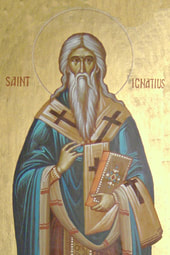 Tomorrow we celebrate the feast day of Saint Ignatius of Antioch. Although we do not know much about his early life, the last several months of his time on earth echo throughout history. Ignatius was appointed bishop of Antioch around the year 69 AD. During his time as bishop, the emperor Trajan called him an “evil spirit who leads his people to destruction.” Ignatius, also known as Theophorus (which translates to mean “God Bearer”), answered the accusation with this: “There is but one God, who created Heaven and Earth, and all that is in them, and one Jesus, made Christ, into whose kingdom I earnestly desire to be admitted.” His defiance angered Trajan and prompted him to question whether the Jesus he spoke of was the same one crucified by Pontius Pilot. Once again in defiance, Ignatius responded, “Yes, the same, who by his death has crucified both sin and it's author, and who has proclaimed that every make of the devil shall be trodden under foot by those who bear him in their hearts.” In these statements we can see that Ignatius truly epitomizes the name Theophorus. Because of these strong statements, Ignatius was sentenced to death by wild beasts in the Roman Colosseum. He was transported by ship from the seaport of Selucia, but did not travel directly to Rome—which proved to be a great mistake for those trying to rid the world of Christianity. All along his journey through Asia Minor, Christians would receive letters from Ignatius that strengthened their faith and united them. He was afforded traveling partners along the way. One of these friends, Philo, who was deacon of Tarsus and Agothopus, reportedly authored the tale of his martyrdom. Many friends and followers of Ignatius traveled to Rome ahead of the ship to await Ignatius' arrival. This infamous journey produced six letters to churches to the Christian communities throughout Asia Minor. He also wrote a letter to Bishop Polycarp of Smyrna, a fellow companion. These letters not only contain some profound and famous quotes by Ignatius, but are very important and relevant to Apostolic teachings, traditions and early Church beliefs passed on from Jesus to the Apostles, bringing true meaning to Apostolic succession. These letters undoubtedly spurred the growth and strength of Christianity for centuries to come and have proved to be the basis for the development of Christian theology. Ignatius is also known for a “first” in Christian literature, when in the letter to Smyrna, the Catholic church is spoken of. The word he uses is “Katholikos,” a Greek word meaning “universal.” Ignatius said: “Wherever the Bishop appears, there, let the people be, as wherever Jesus Christ is, there is the Catholic Church.” An important fact here is that he didn't need to explain the Greek word. It is suggested by many scholars and theologians that this wasn't the first time the word had been used. Ignatius relentlessly taught the beliefs and practices of the early Church. He stressed the value of the Eucharist, calling it “the medicine of immorality.” He taught loyalty and obedience to the bishops as the “transmitters” of the true Apostolic tradition along with the need for unity and peace. This is still very relevant to the Church today. Prior to his arrival in Rome, Ignatius pleaded to his friends and supporters that they not interfere with his eventual death and martyrdom. He said, “I am God's wheat and shall be ground by teeth of wild animals. I am writing to all the churches to let it be known that I will gladly die for God, if only you do not stand in my way. I plead with you: show me no untimely kindness. Let me be food for the wild beasts for they are my way to God.” He also said, “I prefer death in Christ to power over the farthest limits of the earth. He who died in place of us is the one object of my quest. He who rose for our sake is my one desire.” Leading his flock through faith and love for Jesus Christ, he became a living tradition and disciple of the early Church. Was it the end for St. Ignatius on that bloodied dirt floor of the Roman Colosseum that day? I think not. For as the Bishop of Antioch, he catapulted the growth of the Church and the “one true faith.” He achieved his life’s goal: to be in the presence of Jesus Christ for all eternity. Tomorrow we celebrate the feastday of St. Ignatius of Antioch, early Church Father, proclaimer and defender of the faith, and true disciple of Christ. We can all take inspiration from his true devotion to the Church and her mission. A celebration of a Saint, indeed! Mark A. Straub, Sr. is a member of the Knights of Columbus and president of the parish council of Our Lady of the Woods Parish in Woodhaven, Michigan.
On September 14th, we celebrate the feast day of the Exaltation of the Holy Cross. In the Gospel of John, Jesus tells us: “No one has greater love than this, to lay down one's life from one's friends” (John 15:13). That love is never more evident than our Lord's passion and death on the Cross. By that Holy Cross, we have been redeemed. Jesus Christ foretold his Passion to the Apostles, instituted the Eucharist at the Last Supper, and fulfilled God's plan for human salvation at Calvary upon that Holy Cross. This, my friends, is the greatest love ever known to humankind; by the grace of God, we will come to know the fullness of God's love in eternity. The promise of eternal salvation was made possible upon that Cross and we, as Catholics, are called to pick up our cross and follow Christ daily. This is a very hard thing to accomplish in today's world.
Jesus gave us the Holy Spirit at Pentecost to guide and strengthen us while following his commands. Paul tells us: “I have the strength for everything through him who empowers me” (Philippians 4:13). Jesus Christ empowers us with the Holy Spirit today just as he did with the Apostles. It is exactly that God-given power that we need in today’s often secular world to preach Christ crucified and “fight the good fight,” as St. Paul says. For if we profess Christ without recognizing and living his sacrifice on the Cross, we cannot be disciples of the Lord. Peter found that out when Jesus admonished him after the foretelling of his passion and death. I keep written on my desk calendar in my office and in my daily liturgical calendar, a Latin phrase that I think summarizes this idea: Lex orandi, Lex credendi, Lex vivendi - As we worship, So we believe, So we live. As we worship, so we believe, so we live. We must, through worship and prayer, “Love the Lord, your God, with all your heart, with all your soul, and with all your mind” (Matthew 22:37). We must believe all that Jesus has taught us, that he is our Lord and Savior, and that he suffered and died so that we may live. We must live out our faith in what Jesus has called us to do by spreading the good news and picking up our cross and following our Lord. This is not an easy task. It isn't easy being a Christian. Christ never said it would be easy. Being a Christian is not just being a member of a religion, it is our way of life. We live the faith Christ gave to us. When we struggle with this, when we get lazy or complacent with our prayer time, or if we need a reminder of just how much we are loved and what our calling is, we need only to gaze upon the Holy Cross. We can also reflect on the Prophet Isaiah, when he told us exactly what Christ has done for us and for the salvation of man: "Yet it was our pain that he bore, our sufferings he endured. We thought of him as stricken, struck down by God and afflicted, but he was pierced for our sins, crushed for our iniquity. He bore the punishment that makes us whole, by his wounds we were healed" (Isaiah 53:4-5). Brothers and sisters in Christ, we celebrate the Feast of the Exaltation of the Holy Cross.” Remember, worship, believe, and live in the glory of Christ crucified! Mark A. Straub Sr. is a member of the Knights of Columbus and president of the parish council of Our Lady of the Woods Parish in Woodhaven, Michigan. 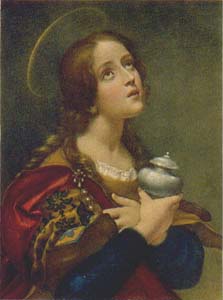 Today we celebrate the memorial of Saint Mary Magdalene. Many of us probably remember Mary Magdalene as one of the women who remained at the feet of Jesus throughout his suffering and death on the cross. Or, we might remember her as the first person to witness his Resurrection. Both roles are very important to consider as we examine the readings from today and their importance in recognizing God’s presence in our lives. Today’s Gospel from John focuses on Mary Magdalene’s visit to the tomb of Jesus. She arrives, finds it empty, and weeps. When confronted by Jesus, she can only say, “Sir, if you carried him away, tell me where you laid him, and I will take him.” Mary Magdalene is blinded by her grief, her own human failings, because in that moment, she believed her struggles were greater than God himself. She has forgotten Christ’s promise that he will rebuild this temple in three days (Cf, Jn 2:19). She, who sat at the feet of Jesus as he suffered on the cross, does not recognize that Christ is standing in front of her. We often go through life like Mary Magdalene, blinded by our everyday fears and hardships, but her life and her actions give us an example to follow. Though blinded by her own human failings, she learned to have faith and trust in the constant presence of the mercy and love of Christ. Christ says to her, “But go to my brothers and tell them, ‘I am going to my Father and your Father, to my God and your God.” With these words Christ proves to Mary Magdalene and to us that by his death and resurrection he has given mankind the ability to develop a personal relationship with God. Even after his death, he is calling Mary Magdalene and the disciples to more, to recognize that through his suffering on the cross he has transcended death and opened the gates of heaven to us. He calls us to renew our faith in him, “to my Father and your Father, to my God and your God.” He calls us into his arms, to know him, to love him, and serve him. This Gospel scene with Mary Magdalene reminds us that we are often blind to Christ’s presence in our lives. We sometimes forget just how significant his death on the cross actually was, we forget that he laid down his life so that we could overcome our daily struggle with sin and that we might one day be one with the Lord in heaven. This is a hard message to remember especially in these recent months in which a plane carrying 295 innocent people was shot down and people are being killed all around the world in the Ukraine, Israel, and Africa. Many of us feel lost and unable to help against this senseless violence and yet Mary Magdalene gives us the answer. That answer is Christ. He is always here for us. He is always present. We might not be able to see him at all times, for we are often blinded by our human failings, our pride, and our worldly desires, and yet Christ remains present to us. We have, like Mary Magdalene, to just open our eyes and trust in the Lord. We have to offer ourselves up as he did in the only way we know how, in imitating the life of Christ every day, first and foremost through prayer. By answering his call to know him, to love him, and to serve him we give ourselves completely to him just as Mary Magdalene did. St. Theresa of Avila gives us a simple prayer to remember the continuous presence of Christ in our lives, we but only have to look for him: Let nothing disturb you, let nothing frighten you, all things are passing away: God never changes. Patience obtains all things, whoever has God lacks nothing; God alone suffices. Nicholas Shields is a current District Deputy for the Washington, D.C. Knights of Columbus and a recent graduate of The Catholic University of America.
The belief that faith and reason are complementary ways of coming to know the truth, rather than antagonistic rivals or competitors for one’s allegiance, has its foundation in the NT itself and, ultimately, in a person rather than a text.
When the earliest of Christian writers were searching for ways in which to articulate the meaning of what we might call the “Jesus Event,” i.e., the life, death and resurrection of Jesus of Nazareth, one of the first associations they made was between Jesus and the ‘wisdom’ [σοφία] or ‘reason’ [λόγος] of God. Drawing from the book of Wisdom, St. Paul refers to Christ as “the wisdom [σοφίαν] of God” (1 Cor 1:24). “All things were created through him and for him,” the Apostle states elsewhere, “He is before all things, and in him all things hold together” (Col 1:16-17). These latter remarks about Jesus, the identification of him with God’s divine wisdom, NT scholars agree pre-date St. Paul himself. They were, most likely, part of a hymn to Christ which the early Christian community used in their liturgical services. Thus, from the very beginning of Christianity, before the composition of the NT, Christians understood Jesus as the incarnation, the en-fleshment, of God’s divine wisdom; the wisdom by which God created, governs and sustains the natural world. The living embodiment of the ‘plan’ (ratio) according to which the cosmos was designed and functions. A bit later in Christian history, around the year 90, this belief was given its classic expression in the prologue to St. John’s Gospel: “In the beginning was the Word [λόγος], and the Word was with God, and the Word was God. He was in the beginning with God. All things came to be through him, and without him nothing came to be” (Jn 1:1-3). The Greek term for ‘Word’ [λόγος] in this translation can have many meanings: word, speech, language, an account or narrative, or an explanation. It can also mean, most importantly, ‘reason’ or ‘thought.’ So if we exchange translations, we can read the same passage as: “In the beginning was Reason and Reason was with God, and Reason was God. He was in the beginning with God. All things came to be through him, and without him nothing came to be.” With his obvious linguistic allusion to Genesis 1:1 [i.e., “In the beginning…”], the author of the prologue is affirming the divine nature of God’s reason and wisdom. A few verses later, of course, the author takes the further step of associating this Reason with the person of Jesus: “And the Word [Reason] became flesh and made his dwelling among us” (Jn 1:14). For the Catholic, then, as true now as was for these early Christian authors, it is in God, and especially through the person of His Son Jesus Christ, that Wisdom, Reason and Truth have their being. As Jesus said: “I am the way the truth and the life” (Jn 14:6) and “for this I was born and for this I came into the world, to testify to the truth. Everyone who belongs to the truth hears my voice” (Jn 18:37). Understanding that the world was created according to divine reason, and that the seeds of reason are to be found in the entire created order, the Catholic tradition has long affirmed the human capacity, and supported the human effort, to discover truth in the natural world by the light of human reason. It is true that the early Christian theologian Tertullian famously asked the question: “What has Athens to do with Jerusalem?” (De praescr. haeret. 7). But on that matter, and quite a few others, Tertullian was departing from the established Christian thought of his time. The Catholic tradition, on the other hand, acknowledges that since truth cannot be opposed to itself, the truths of the faith cannot contradict those of science or reason (cf. Aquinas SCG 1.7). Faith and reason are not competitors, but the two complementary ways in which humankind might come to know the truth. This point has been articulated throughout the Catholic intellectual tradition and, more recently, the Second Vatican Council stated that “methodical research, in all realms of knowledge, if it respects […] moral norms, will never be genuinely opposed to faith: the reality of the world and of faith have their origin in the same God” (GS § 36). Likewise, Pope St. John Paul II stated that faith and reason are two complimentary ways of coming to the truth because “the unity of truth is a fundamental premise of human reasoning, as the principle of non-contradiction makes clear” (FR § 34). The mutual necessity of both faith and reason is nowhere more evident than in the discipline of theology. In examining the application of reason to matters of faith, St. Augustine once wrote: intellege ut credas, crede ut intellegas (‘to understand so that you might believe, to believe so that you might understand’) (s. 43.9). More than half a millennium later, the Benedictine archbishop of Canterbury, St. Anselm, meditating on St. Augustine’s thought, would famously define theology as fides quaerens intellectum (‘faith seeking understanding’) (Cf. Pros. 1-2). In attempting to sum up this intellectual inheritance, this particularly Catholic way of viewing, inter alia, the relationship between faith and reason, many writers have taken to calling this hermeneutic the Catholic “both/and.” As opposed to looking at the world and seeing a multitude of choices which demand an “either/or” decision, the Catholic “both/and,” being sensitive to false dichotomies, sees the value – and in many instances the necessity – of each choice: nature and grace, action and contemplation, freewill and providence, invisible grace and material signs, and, of course, faith and reason. From the Catholic perspective, therefore, the relationship between faith and reason has never been an antagonistic one. Rather, the Catholic sees the proper use of one’s intellect as an activity which draws us nearer to God by seeking His Wisdom. Anthony Coleman teaches theology for Saint Joseph’s College Online This blog post was originally published on the St. Joseph’s College of Maine Theology Faculty Blog. Click here to learn more about our cooperative alliance with St. Joseph’s College Online. "The joy of love, the answer to the drama of suffering and pain, the power of forgiveness in the face of an offence received and the victory of life over the emptiness of death" (Porta Fidei, 13)
Death is often something that we do not like to discuss, especially in the context of the New Evangelization. These two concepts might seem like they don’t mix well, but I hope to show how they are. It is quite natural that we try to deflect the topic of death and dying and why we do not want to face the reality of a difficult situation. But, when death comes into our lives we have no control and it is something that we must handle. After the wake and the funeral are over, and the family goes home, the void is sill there. The sense of loss does not want to go away and it seems like we cannot move on from the loss. On March 7th, I went though this pain for the fourth time this past year with the passing of my paternal grandfather and namesake. I lost two grandfathers, a cousin, and a close family friend who I consider more like an uncle. Each of these individuals have greatly impacted my life and I would not be who I am without them. Recently I have done a lot of reflecting on what these lives have meant to me. Time and time again I go back to the number of lessons that my grandfathers' have taught me. They taught me some of the classics like fishing, a love for music and art, gardening and the importance of a good cup of British Tea or Italian coffee. But it was not these lessons that are the most import that matter. These two men also taught me the importance of family, tradition, love, and faith. My maternal grandfather was a great lover of music; he was singer and a violinist. He introduced me to the Masses written by Mozart, Beethoven, and Verdi. Through his love, he showed me how music can represent a love for God and his creation. Music has come to affect my life and how I pray to God. He broadened my horizons and taught me about musical tradition that dated back centuries, and his love for this went far beyond the music itself. It helped one transport oneself to become close with God. My paternal grandfather taught me two different aspects of faith: a devotion to Mary and the importance of service. He suffered from Alzheimer's disease, which caused great pain and eventually an almost complete loss of memory. There were only four things he could remember before he passed away; his brother, his wife (my grandmother), his personal motto, which was “great and grateful no matter what”, and how to pray the Hail Mary. His devotion to the Blessed Mother was a quiet one. His service to others was like his devotion, a quiet one. He was just as happy serving on a board of trustees or picking up trash at the church picnic as long as it helped others. On the night before my paternal grandfather's funeral, one of our parish priests began the prayer vigil. He offered a short reflection on what this meant and there was a part of it that has stuck with me. This young priest said that our relationship with the dead was not over, but rather was changed. The relationship was now through the eternity of Jesus Christ. Our faith teaches us that Christ connects us regardless of time and that life continues after death. The New Evangelization is a reminder of this hope and comfort. Pope Emeritus Benedict got this right in Porta Fidei, it is the joy of love that conquers death and gives us hope. This hope is found in our faith, and fills the void from the loss. While the sting of death will always be present, it is Christ, who walks with us at every step, who takes away the sting and returns our capacity to love one another. Pat Fricchione is the Research and Production Associate for the Catholic Apostolate Center We have all been there – mid-morning on Ash Wednesday, awkwardly trying to hide the fact that our stomach is grumbling, wondering what actually constitutes as a “small meal”, and attempting to find it within ourselves to pray when all we can think about is those pangs of hunger. Or the classic Friday in Lent – where every meatless option seems unappetizing, and it is impossible to stop thinking about how badly we want chicken nuggets. Or that Lent when you decided to give up all sweets and you find yourself agonizing over whether or not a frosted donut really counts as a sweet . . . Why is this? Why is it that on days (or seasons for that matter) where we are called to fast or abstain from certain foods or other comforts, we feel conflicted about what the Church is calling us to do? There are any number of contributing factors (including the fact that chicken nuggets and donuts are delicious), but the heart of the matter is this: when we make sacrifices both big and small, we are often focused on what we are doing and forget the sacrifices of Lent are really about what is being done to us.
In her wisdom, the Church gives us Lent to take a step back - to simplify and to ultimately journey towards Christ in His suffering, death, and resurrection. During this season we are more aware of what we are giving up – of the sacrifices that we are making, and those things that we are temporarily missing out on enjoying. It can be all too easy to fall into the trap of grudgingly accepting what we have decided to sacrifice, instead of using it as an opportunity to better ourselves on the journey to Easter. Every time we make the mistake of thinking our own sacrifices about us, we are missing the point of this Lenten journey. The reality of the world that we live in is that sacrifice is underrated – our friends and people around us may not understand why we would willingly give up earthly comforts for a Church season. But we know differently. Every small sacrifice we make is about becoming more aware of the sacrifice that Christ made for us 2000 years ago. Instead of sighing in frustration about what we cannot have every time our stomach growls, we should utter a prayer of gratitude for the chance to conform our lives more to the life of Christ. We have the privilege to journey through these 40 days towards the cross of Good Friday. Although we all have to take up our own small crosses in the form of prayer, fasting, and almsgiving, the most important thing we will do is walk confidently towards the cross of Christ. The beauty of the cross is that it is bigger than any one thing that we can do, and the cross has the power to continually renew us in our mission as baptized Christians. So although we may be temporarily missing our favorite treat or meat on Fridays, we can take hope that our sacrifices are not about how much we can do, they are about making ourselves more ready to celebrate the Easter Sunday that comes after the Good Friday. Lauren Scharmer is a senior at the Catholic University of America studying Social Work & Theology and is active in both retreat and youth ministry in both the Archdiocese of Washington, D.C. and Diocese of Arlington. Today marks the 8th anniversary of Bl. John Paul II death. He was a man who proclaimed Christ triumphant victory over death with great zeal. This day, as we pray for his intercession, let us mediate on his words on the Risen Christ that he shared on Easter Sunday, April 23, 2000.
'O death, where is your sting?' (1 Cor 15:55) "Mors et vita duello conflixere mirando . . ." "Death and life have contended in that stupendous combat: The Prince of life, who died, reigns immortal" (Easter Sequence). Once again, today, the whole Church pauses in amazement at the empty tomb. Like Mary Magdalen and the other women, who came to anoint with spices the body of the Crucified One, like the Apostles Peter and John who came running at the word of the women, the Church bows before the tomb in which her Lord was placed after the crucifixion. A month ago, as a pilgrim in the Holy Land, I had the grace of kneeling before the stone slab which marks the place of Jesus' burial. Today, Easter Sunday, I make my own the proclamation of the heavenly messenger: "He is risen, he is not here" (Mk 16:6). Yes, life and death were locked in combat and Life was victorious for ever. All is once again oriented to life, to Eternal Life! "Victimae paschali laudes immolent christiani . . ." "Christians, to the Paschal Victim offer sacrifice and praise. The sheep are ransomed by the Lamb; and Christ, the undefiled, has sinners to his Father reconciled". The words of the Easter Sequence marvellously express the mystery accomplished in Christ's Passover. They point to the power of renewal flowing from his Resurrection. With the weapons of love, God has defeated sin and death. The Eternal Son, who emptied himself to become the obedient servant to the point of dying on the Cross (cf. Phil 2:7-8), has conquered evil at its roots by opening to contrite hearts the path of return to the Father. He is the Gate of Life who at Easter overcomes the gates of hell. He is the Door of salvation, opened wide for all, the Door of divine mercy, who sheds a new light on human existence. The Risen Christ signals the paths of hope along which we can advance together towards a world more just and mutually supportive, in which the blind egoism of the few will not prevail over the cries of pain of the many, reducing entire peoples to conditions of degrading misery. May the message of life proclaimed by the angel near the stone rolled back from the tomb overturn the hardness of our hearts; may it lead to removing unjustified barriers and promote a fruitful exchange between peoples and cultures. May the image of the new man, shining on the face of Christ, cause everyone to acknowledge the inalienable value of human life; may it encourage effective responses to the increasingly felt demand for justice and equal opportunity in all areas of society; may it impel individuals and States to full respect for the essential and authentic rights rooted in the very nature of the human person. Lord Jesus, our Peace (Eph 2:14), Word made flesh two thousand years ago, who by rising from the dead have conquered evil and sin, grant the human family of the third millennium a just and lasting peace; bring to a happy outcome the talks undertaken by people of good will who, despite so many doubts and difficulties, are trying to bring an end to the troubling conflicts in Africa, the armed clashes in some countries of Latin America, the persistent tensions affecting the Middle East, vast areas of Asia, and some parts of Europe. Help the nations to overcome old and new rivalries, by rejecting attitudes of racism and xenophobia. May the whole of creation, inundated by the splendour of the Resurrection, rejoice because "the brightness of the eternal King has vanquished the darkness of the world" (Easter Proclamation). Yes, Christ has risen victorious, and has offered man, Adam's heir in sin and death, a new heritage of life and glory "Ubi est mors stimulus tuus?". "O death, where is your sting?" (1 Cor 15:55), exclaims the Apostle Paul, touched on the road to Damascus by the light of the Risen Christ. His cry echoes down the centuries as the proclamation of life for the whole of human civilization. We too, the men and women of the twenty-first century, are invited to be mindful of this victory of Christ over death, revealed to the women of Jerusalem and the Apostles, when they arrived hesitantly at the tomb. Through the Church, the experience of these eye-witnesses has come down to us too. It is a significant part of the journey of the pilgrims who, during this Year of the Great Jubilee, are entering through the Holy Door, and going away with renewed courage to build pathways of reconciliation with God and with their brothers and sisters. At the heart of this Year of grace, may the proclamation of Christ's followers be heard more loudly and clearly, a joint proclamation, beyond all divisions, in ardent longing for full communion: "Scimus Christum surrexisse a mortuis vere". "Yes, that Christ is truly risen from the dead we know, Victorious King, your mercy show!" Amen URBI et ORBI Message of His Holiness Pope John Paul II As we enter into the Holy Triduum for the first time under the pastoral care of Pope Francis, we bring you the first Holy Thursday homily of Bl. John Paul II, given in the Basilica of St. John Lateran on April 12, 1979.
"The "hour" of Jesus has come. The hour of his passage from this world to the Father. The beginning of the Holy Triduum. The Easter mystery is again clothed, as every year, by its liturgical aspect, beginning with this Mass which—alone during the year—bears the name of "Coena Domini." Having loved his own who were in the world, "he loved them to the end" (John 13:1). The Last Supper is precisely the witness of this love with which Christ, the Lamb of God, loved us to the end. On that evening, the children of Israel, according to the old prescription, ate the lamb given by Moses on the eve of their exodus from slavery in Egypt. Jesus does the same with the disciples, faithful to the tradition which was only the "shadow of the good things to come" (Heb. 10:1), only the symbol of the New Covenant and of the new Law. What does it mean: "He loved them to the end"? It means: until that fulfillment which was to take place the following day, on Good Friday. On that day, God was to reveal how much he loved the world, and how, in that love, he had come to the extreme limit of giving, to the point, that is of "giving his only Son" (John 3:16). On that day, Christ showed that "greater love has no man than this, that a man lay down his life for his friends" (John 15:13). The love of the Father was revealed in the giving of the Son. In the giving through death. Holy Thursday, the day of the Last Supper, is in some sense the prologue of this giving, and the last preparation for it. And, in some sense, what was accomplished on that day goes beyond such a giving. It was just on Holy Thursday, during the Last Supper, that the meaning of: "He loved to the end", was revealed. Rightly, in fact, we believe that loving to the end means until death, until the last breath. The last Supper teaches us, however, that, for Jesus, "to the end" means beyond the last breath. Beyond death. This is, indeed, precisely the significance of the Eucharist. Death is not its end, but its beginning. The Eucharist begins with death, as St Paul teaches: "For as often as you eat this bread and drink the cup, you proclaim the Lord's death until he comes" (Cor. 11:26).The Eucharist is the fruit of this death. It recalls it constantly. It continually renews it. It always signifies it. It proclaims it. The death which has become the beginning of the new Coming: from the Resurrection to the Parousia, "until he comes”. The death which is the foundation of a new life. Loving "to the end" means therefore, for Christ, loving through death and beyond the barrier of death: loving as far as the extremes of the Eucharist! It was just in this manner that Jesus loved on that last evening. He loved his "own"—those who were then with him—and all those who were to inherit the mystery from them. — The words he pronounced over the bread, — the words he pronounced over the cup full of wine, — the words we repeat today with particular emotion, and always repeat when we celebrate the Eucharist, are precisely the revelation of this love through which, once and for all, for all time and until the end of the ages, he shared himself! Even before giving himself on the cross, as the "Lamb who takes away the sins of the world", he shared himself as food and drink: bread and wine, so that "they may have life, and have it abundantly" (Jn 10:10). It was thus that he "loved to the end.” Therefore, Jesus did not hesitate to kneel before the Apostles to wash their feet. When Simon Peter opposed it, he persuaded him to let him do so. It was, in fact, a particular need of the moment's greatness. This washing of the feet, this purification before the Communion in which they were henceforth to participate, was necessary. It was necessary. Christ himself felt the need to humble himself at the feet of his disciples: a humbling which tells us so much of him at the moment. From that time onwards, by sharing himself in the Eucharistic Communion, would he not continually lower himself to the level of so many human hearts? Would he not always serve them in this way? “Eucharist" means "thanksgiving.”"Eucharist" also means "service," the reaching out towards man: the serving of so many human hearts. "I have given you an example, that you also should do as I have done to you" (Jn 13:15). We cannot be dispensers of the Eucharist unless by serving! Now is the Last Supper. Christ prepares himself to depart through death, and through death itself prepares to remain. Thus, death has become the fulfillment of love: he loved us "to the end.” Would not the context of the Last Supper in itself be enough to give Jesus the "right" to say to us all: "This is my commandment, that you love one another as I have loved you" (Jn 15:12)?" Blessed John Paul II gave these words in his homily on Holy Thursday, 1979. "Let us never forget that authentic power is service." - Pope Francis
As we enter into the time of the Easter or Paschal Triduum, the holiest days of the liturgical year, we have an opportunity to reflect, remember, and relive the great redemptive love of Christ, not only in prayer, but also through how we live daily this love. Day after day since his election, Pope Francis has offered us witness of how to live this love in the simple acts of our everyday life. Because what he is doing is seemingly different from the past, his actions are considered dramatic. They are, however, the non-dramatic, counter-cultural, and normal actions of an apostolic person, one who lives the love of Christ concretely in service to others - as Jesus did when he washed the feet of the Apostles in the Upper Room. As bearers of the love of Christ to others, we join in their suffering, their pain, their rejection - as we unite with Jesus in his suffering and death on the Cross. Yet, we live in hope that the love of the Father which conquered sin and death and raised Jesus up on Easter morning gives us hope to continue our sharing of the love of Christ to all, no matter what the cost. Please know that we are keeping you in prayer during this special time. If you have any special intentions that you would like us to pray for during the Holy Triduum, please send them to us (via email, Facebook or Twitter) and they will be remembered. The entire Catholic Apostolate Center team wishes you a prayerful Paschal Triduum and a blessed Easter season! May the charity of Christ urge you on! Fr. Frank S. Donio, S.A.C., D. Min, Director of the Catholic Apostolate Center wrote this piece for the Holy Week edition of the Catholic Apostolate Center Newsletter. Contact us to sign up to receive our news letter! The Paschal what? Ever wonder what the Triduum is and when and how we celebrate it? Here are a few great resources to check out! 1. 18 Questions and Answers on the Paschal Triduum: The United States Conference of Catholic Bishops has provided an excellent resource for us seeking a greater understanding of the importance of the Pashcal Triduum, which takes place this week. Questions range from simply, "When does the Triduum begin and end?" to inquires on Good Friday devotionals and liturgical norms during this time. With clear and direct responses to each of the proposed questions that commonly arise during Holy Week, it's a great resource no matter the depth of your theological background. 2. Holy Week reflection: A brief reflection on the meaning of Holy Week by Fr. Thomas Roscia, C.S.B of Salt and Light Ministries. 3. Holy Week in Two Minutes: A resource of Busted Halo ministries, this "Holy Week in 2 Minutes" clip is a brief explanation of the importance of the events of this week in the life of the Catholic Church. An excellent resource that's ideal for sharing via social media such as Facebook and Twitter, it's worth 2 minutes of your time! Resources were gathered by David Burkey, Communications Coordinator for the Catholic Apostolate Center St. Joseph is known as the Shadow of the Eternal Father, the Perpetual Adorer, the Patron of the Universal Church, the Patron of the Suffering and Dying, the True Foster Father of Jesus Christ, and Most Chaste Spouse of the Ever-Virgin Mary. He shows how a person must rely on the Father’s providence, trust the boldness of the Holy Spirit, and cherish the Incarnate Jesus, all while staying close to the Virgin Mary. St. Joseph is a model of faith and in a unique way he upholds the dignity of all vocations.
Joseph survives and thrives as a person of faith by abandoning his life and family completely to God. The Devil, Herod, and everyday difficulties, like not being able to find a place for his wife to give birth, threaten Joseph’s most precise gifts. A faithful person humbly resigns what they care about most to the Giver of All Gifts only to receive back what is best blessed and renewed. Joseph protects his family through surrendering them to God. How wonderful St. Joseph’s prayers must have been. The way he took his fears and insecurities to God to receive true strength must have been so beautiful. There are many ways that we know that St. Joseph’s faith was profound. The Virgin Mary knows for sure that she has never been with a man, but Joseph does not. St. Joseph trusted in the words of an angel in a dream. The angel said, “Joseph, son of David, do not be afraid to take Mary home as your wife, because what is conceived in her is from the Holy Spirit” (Mt. 1:20). Catholic theology of the Trinity had not been developed yet leaving Joseph not knowing with any sort of clarity who this “Holy Spirit” was that had impregnated his fiancée. St. Joseph demonstrates that his faith is not the kind that limits God by being attached to personal plans and expectations, but is one that allows God to act boldly. His faith is fulfilled by being lived out; he did take Mary as his bride, he did raise Jesus as his son, he did go wherever the Lord commanded him. Joseph fled to Egypt when Jesus’ life was being threatened and he returned home when he was told, doing everything in accordance with God’s will and timing. The obedient Joseph, as the Perpetual Adorer of the Christ-child can also help us grow in intimacy with Christ. Have we ever realized that the baby Jesus was most likely birthed into the callused hands of his carpenter foster-father? St. Joseph knew Jesus in a radically unique and intimate way. Joseph was able to adore the Eucharist while it was still breathing. We can relate to Joseph in the struggles that he faced and the fact that he was not spared from original sin. He was broken, flawed, sinful, fearful, and even being tempted. Joseph, as most chaste spouse, did not reduce Mary to an object of pleasure but he honored her as a whole person. We can imagine that Joseph embraced his call to chastity not begrudgingly but with great joy. Their intimacy honors the glory of creation by neither of them trying to dominate or manipulate the other for personal gain. How immaculate their interactions must have been! St. Joseph and Mary model for us a pure intimacy rooted in trust, commitment, and the will of God. With these considerations in mind we see St. Joseph as an inspiration for all people because he was called to marriage, parenthood, and celibacy. Whether we are called to marriage, religious life, priesthood, or the single-life we should entrust ourselves to St. Joseph and know that he understands the burdens that we carry. As a good father he will teach us to trust God completely and to allow the Holy Spirit to move in dramatic and unexpected ways. With Joseph as a model of faith we will honor the dignity of all people, love Mary, and intimately adore the Incarnate Christ. Daniel Hoover works at St. Mary’s Parish in the Diocese of Wilminigton, DE as a Lay Ecclesial Minister. Decisions made in the voting booth are deeply personal and reflect a combination of our experiences and beliefs. And as Catholic American citizens, now is a critical time. The outcome of the presidential election will have far-reaching consequences and it is our responsibility to seriously consider our choice of leaders and policies that will guide our nation and our state.
Catholic voters are once again caught between their desire to participate in civic life and the choice of candidates for elected office falls short of a vision of the common good as rich and full as Catholic social teaching presents. Consequently, many have become subject to the mentality that being Catholic and politically active are incompatible. But this is not so. Catholics are called to understand and accept the Church’s teaching as a means of becoming more engaged in political life. It may be challenging, but it is something we have to wrestle with. At an address this past month, Archbishop Chaput of Philadelphia said, “We believe in the separation of Church and State, but that is not the same thing as separation between faith and politics. Faith is what we believe, politics is how we act.” He advised Catholics to “apply the principles of Catholic social teaching – such as the common good and subsidiarity”, to their voting decisions. We have the duty as citizens to participate in our own governments for the sake of the common good. By not doing so, we abandon the political process and risk unjust laws being formed. Poorly formed legislation and leadership may come about anyway, but it should not come about as the result of Catholics disregarding the process. Casting an informed vote is one of the best things we as Catholic citizens can do for our country. It is the duty of citizens to contribute – along with the civil authorities – to the good of society in a spirit of truth, justice, solidarity and freedom. “The love and service of one’s country follow from the duty of gratitude and belong to the order of charity" (CCC 2239). And so as Catholic citizens, we enlighten and develop our consciences as citizens in accordance with the principles of Catholic Social Teaching. One straightforward and immediate way Catholic voters can make a meaningful contribution to public discourse is to draw the larger public’s attention to issues that are essential to Catholic social thought. The most essential of these is the dignity of every human person and each one’s basic right to life from conception to natural death. Respect for human dignity has an essential role in the respect of all human life, especially the fundamental right to life. It is a natural principle that is supported by our beliefs; it is our faith, as His Holiness states in Porta Fidei, that “opens our eyes to human life in all its grandeur and beauty.” As Catholic voters, we have to see ourselves as bridge builders. According to Bishop Richard Pates of Des Moines, Iowa, and Chairman of the Committee on International Justice and Peace for the USCCB, “The Catholic vision is one of collaboration, not coercion, among individuals, governments, businesses and other institutions.” Voting in this election is not based on profit or having a winning ideology. Our “Catholic vision” is one that creates an environment in which all people can develop and ultimately flourish. Along with tens of millions of fellow citizens, I urge you, Catholic voters, to cast your ballot today. Commit yourself to creating conditions that fully respect the dignity God has bestowed upon all of us. Our political responsibility doesn't stop at the polls this Election Day. We must always respond to the social issues, locally and nationally, that affect the dignity in which we are all created. Sarah Morris is a senior Politics major at The Catholic University of America. |
Details
Archives
July 2024
Categories
All
|
About |
Media |
© COPYRIGHT 2024 | ALL RIGHTS RESERVED

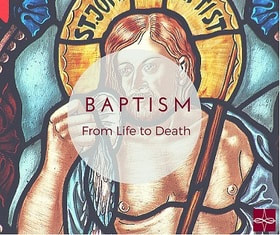

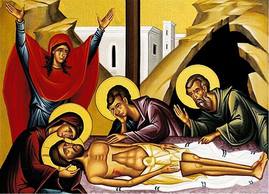
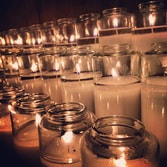
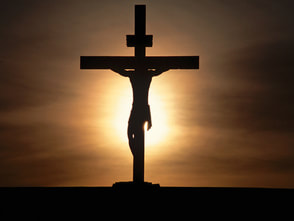



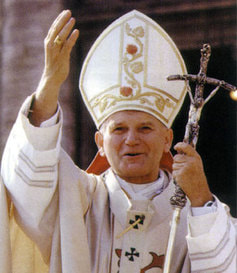
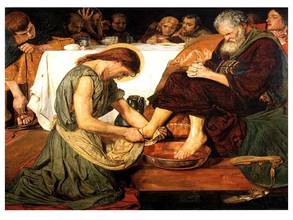
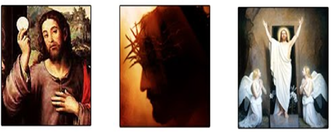
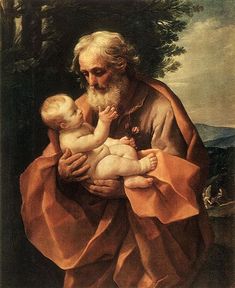
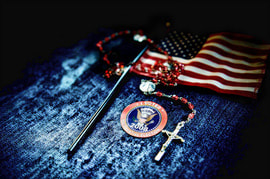
 RSS Feed
RSS Feed